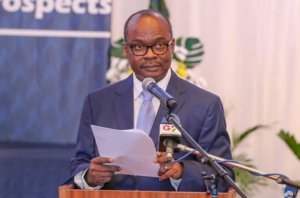
Accra, Ghana//-Ghana’s digital payments system has seen significant improvements over the past decade, particularly in terms of payment infrastructure, but the country remains largely a cash society.
African Eye Report explores the Bank of Ghana (BoG) initiatives, policies, laws, regulations and systems governing Ghana’s payment environment and the way forward.
Overview of digital payments
Ghana’s payment system has improved significantly since 1997 when the Magnetic ink character recognition (MICR) code which is a character recognition technology used mainly by the banking industry to streamline the processing and clearance of cheques and other documents were introduced, and continues to evolve to meet the developmental needs of the country, according to the Bank of Ghana (BoG).
The country’s digital payments system according to industry experts has undergone major change, influenced by not only global trends in payment system development, but also by changing economic, financial and public policy objectives, and growing local ICT industry.
The development of Ghana’s payment system KPMG report says has been driven by seven key objectives include: – To prevent and/or contain risks in payment, clearing and settlement systems – To establish a robust oversight and regulatory regime for payment and settlement systems; and – To bring efficiency to the fiscal operations of the Ghana Government.
On the whole, Ghana’s payment landscape has been positively influenced by improvements in national economic infrastructure such as the availability of GSM technology, increased internet penetration and the rising deployment of ATMs over the past decade.
Eli Hini, the Chief Executive Officer of MobileMoney Limited, mobile financial subsidiary of MTN Ghana, added that the government’s national policy commitment, BoG’s flexible regulatory environment, advent and growth of Mobile Money Service market, strong and growing local ICT/Fintech Industry, and growth of telecom industry are the major enablers of the rise of digital payments market in the country.

While the digital payment channels in the country, he mentioned are-cheques, cards, USSD, electronic funds transfer, mobile money platforms and mobile apps, internet banking, and digital wallets.
These digital payment channels according to him are used for Payment to Government (P2G,B2G), Government Payments (G2P, G2B), Business to Business (B2B), Merchant and Retail Payment (P2M), Public Utility Payments, and person-to-person ( P2P).
Key initiatives and milestones
The Ghana Interbank Settlement System (GhIPSS) was launched in 2002 as a real-time gross settlement system designed to link the head offices of banks to the BoG to enable real-time gross electronic payments among banks.
To help migrate Ghana towards broader use of electronic payments, the Central Bank established GhIPSS Limited to own and operate e-payments schemes and infrastructure within the country.
GhIPSS, which is ISO 27001 certified since its establishment, has implemented and operates the National Switch and the Biometric Smart Card Payment System, e-zwich and the Cheque Code-line Clearing (CCC), Automated Clearing House (GACH) systems, and Interoperability platform.
Stakeholders at this year’s MTN MoMo Forum organized by MobileMoney Limited have expressed worry over the high cash usage despite these giant strides in Ghana’s financial digitization process over a decade.
According to the stakeholders comprising Mobile Money (MoMo) operations, banks, regulator, and consumers, more than 70% of transactions are still being done in cash.
The Governor of BoG, Dr Ernest Addison, said: “With such giant strides in Ghana’s financial digitization process, one would have thought that cash usage would go down to the barest minimum. Unfortunately, this is not so, despite the attendant risks with cash usage”.
This clearly shows that the adoption of digital payments still remains uneven and there is room for improvement to move the frontier towards financial inclusiveness through broad-based digital payments, he added.
The BoG which is the regulator of the digital payments space as well as the banking and finance sector has provided the requisite leadership in the development of electronic payments in the country.
Over the years, the Bank has revamped the payment systems regulatory and legal frameworks and created an enabling environment to foster innovation and competition.
This also paved way for payment service providers, especially during this pandemic era to scale up access to digital financial products and services.
These efforts according to Dr Addison have yielded positive results and the mobile money space has contributed significantly to Ghana’s financial inclusion progression.
“Mobile money slots are visible all across the country, and the volume and value of transactions are on the ascendancy”.
He revealed that over the past decade, mobile money accounts have increased thirty-fold, to 44 million in June 2021.
The volume of mobile money interoperability transactions have also increased twenty-four fold since its launch in 2018 to 10.3 million in June 2021, while GHIPSS Instant Pay volume of transactions has also increased significantly since 2016, according to the Governor.

Release of e-Money Issuer and Agent Guidelines: The BoG as part of its broader strategy to create a regulatory environment that enables convenient, efficient and safe non-cash retail payment and funds transfer mechanisms, published the e-Money Issuer and Agent Guidelines in 2015.
The Guidelines ensure that e-money services are provided only by regulated financial institutions and duly licensed non-bank entitles engaged solely in regulated and supervised e-money and related activities.
The aim of the Guidelines is to promote financial inclusion by extending financial services beyond traditional branch-based channels.
Interconnect Clearing House: The operation of the Interconnect Clearing House (ICH) in Ghana received a parliamentary approval following the passing of the Electronic Communication (Amendment) Bill, 2016 into law.
This automatically makes the ICH the only way for telecoms network operators to interconnect with each other.
The ICH also creates a common platform that allows telcos to link to the Ghana Interbank Payment and Settlements System (GhIPSS) switches.
Promotion of e-zwich Card use by Government: The GoG has undertaken an initiative to gradually move all public sector workers to payment via the biometric e-zwich card platform.
The platform is already being used by National Service personnel and GhIPSS is now deploying POS devices at shops, filling stations and supermarkets grow the market and help drive the transformation of Ghana towards a ‘cash-lite’ economy.
Regulatory framework
Banking and digital payments are about trust and confidence that the public and users have in the institutions, systems, policies, and products of the financial system.
Security, safety, prudence, and transparency are therefore key to the success of any financial sector. To this end, the banking and payments system in Ghana relies on a robust set of laws, guidelines, and regulations that have promoted the evolution of the payments system.
The main laws covering payment instruments, institutions, clearing and settlement systems in Ghana include:
– Bank of Ghana Act (2002), Act 612: The Act names the BoG as the authority responsible for payment and settlement systems in Ghana.
It notes that the functions of the BoG should include the promotion, regulation and supervision of payment and settlement systems and the facilitation of the clearing of cheques and other credit instruments for banking institutions.
– The Payment Systems Act (2003), Act 662: This law further empowers the BoG to oversee and manage the payment systems.
– The Electronic Transaction Act (2008), Act 772: This law enables businesses and individuals to use electronic communications in the course of satisfying their legal obligations as well as facilitating a safer and easier way to do business online.
– Foreign Exchange Act (2006), Act 723: This Act details the legal provisions for the exchange of foreign currency for international payment transactions and foreign exchange transfers as well as to regulate foreign exchange business and other related matters.
– The Bills of Exchange Act (1961), Act 55: Based on the English Bills of Exchange Act 1882 which specifies how cheques are drawn, accepted and paid.
Other laws including: – Credit Reporting Act (2007), Act 726 – Central Securities Depository Act (2007), Act 733 – Anti-Money Laundering Act (2008), Act 749
2001
Exchange Act, Act 55: This is an adaptation of the English Bills of Exchange Act 1882 which specifies how cheques are drawn, accepted and paid.
2002
Act 612: The Act makes the Bank of Ghana the authority responsible for payment and settlement systems in Ghana. 2002 – The Real Time Gross Settlement (Ghana Interbank Settlement) for wholesale payment and settlements was introduced (Rules and Guidelines).

2003
Systems Act, Act 662: This is a sound legislative framework which further empowers the Bank of Ghana to oversee and manage the payment systems.
2004-2008
– 2006: Foreign Exchange Act, Act 723 – 2007: Credit Reporting Act, Act 726 – 2007: Central Securities Depository Act, Act 733 – 2008: Anti-Money Laundering Act, Act 749 – 2008: Electronic Transactions Act, Act 772
2009-2010
– 2009: Cheque Codeline Clearing System for the electronic clearing of cheques and other paper payment instruments introduced (Rules and Guidelines).
– 2010: Automated Clearing House for automated direct credit and direct debit payments launched (Rules and Guidelines)
2012: Operationalization of gh-link-the national interbank ATM transaction switch (Rules and Guidelines).
2013-2014
– 2013: National Payments Systems Oversight Framework document prepared by Bank of Ghana. – 2014: Strategic Payments Roadmap for Ghana, document prepared by Standard Chartered Ghana under the auspices of Bank of Ghana.
2015-2016
– 2015: Guidelines for e-Money Issuer and Agent Guidelines to regulate and guide mobile money business activities in Ghana. – 2016: Introduction of GHIPSS Instant Pay (GIP) (Rules and Guidelines).
BoG initiatives
Introduction of EMV Tech: The Bank initiated a process to migrate all payment cards from magnetic stripe technology to Europay, Mastercard, and Visa (EMV) technology, to enhance electronic card payment system security.
Payment System Interoperability: In May 2018, GhIPSS launched a national interoperability platform as part of the government’s commitment to foster interoperability across the country’s payments mechanisms.
The platform ensures seamless payments across bank and mobile money accounts and across different mobile networks.
Additionally, it offers assurance and certainty of settlement in central bank funds and the mitigation of settlement and liquidity risk.
Policies
- The National Payments System Oversight Framework, 2013
The BoG’s National Payment System (NPS) Strategy was launched in August 2014 to help guide the development of the payment system in the country. The strategy offers a roadmap to help accelerate the shift from a cash-dominant to a ‘cash-lite’ economy.
Among its recommendations, the NPS calls for the creation of a Payments Council, an effective penalty regime, improved payment pricing transparency for consumers and a strengthening of the relationship between the BoG and the country’s telecommunications companies.
In May 2020, the Ministry of Finance launched three policy initiatives to deepen financial inclusion and accelerate digital transformation: the National Financial Inclusion and Development Strategy, the Digital Financial Services Policy, and the Cash-Lite Roadmap.
These policies will undoubtedly improve Ghana’s digital financial landscape, furthering progress made over the past decade while guiding the creation of a cash-lite economy, which has become essential in the era of COVID-19.
The National Financial Inclusion and Development Strategy, developed in partnership with the World Bank, aims to push financial inclusion from 58% at present to 85% by 2023, provide economic opportunities, and reduce poverty.
This is an incredible target that will reduce the financial inclusion gap, increase financial access points, account ownership, and the uptake of financial products across the country.
The Digital Financial Services Policy, in cooperation with the Consultative Group to Assist the Poor (CGAP), is designed to support a resilient, inclusive, and innovative digital ecosystem that contributes to social development, economic prosperity, and private sector progress.

The Cash-Lite Roadmap, in collaboration with the Better Than Cash Alliance, pinpoints concrete steps to building an inclusive digital payment ecosystem. This includes improving access to financial services, enabling regulation and oversight, and promoting consumer protection.
Way forward
Despite significant progress in the payments ecosystem in recent years, the use of cash remains widespread and endemic, both in terms of value and volume. So, players and regulators in that space need to do more.
By Masahudu Ankiilu Kunateh, African Eye Report

